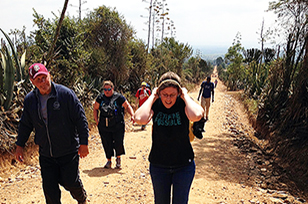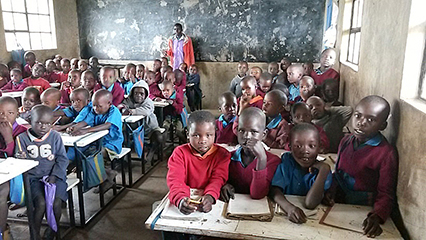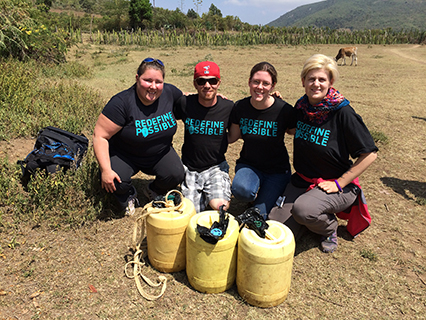Page Content
International co-operation delivers a learning experience for all
Nicole Cross
This experience has been one of a kind. Not only did I have the opportunity to work with other teachers in Alberta, I was able to collaborate with teachers in Kenya as well as with teachers from Ontario.

Alberta teacher Nicole Cross carries a jug of water on her back during a visit to Kenya in July. The chore was a one-time experience meant to demonstrate the challenge faced by local women, who regularly carry water in this fashion for a distance of one or two kilometres. The water is used primarily for livestock and agriculture as families have access to clean drinking water from a well located at the community's school.
The melding of ideas, experiences and teaching strategies made for a wonderful learning experience for all. I was fortunate enough to speak to a number of Kenyan teachers on a variety of subjects. I spoke with both the ECS teacher and one of the Grade 2 teachers about the challenges of special education, the difficulty in acquiring resources and the importance of community support to a school. They both mentioned that they often work after school with students who have learning disabilities as there is little time during the school day to address their needs.
Although I have had the experience of teaching English language learners, it had always been at the high school and adult learning levels. Nothing could have prepared me to teach English language learners in Grade 2, especially as I didn’t speak their first language, Kipsigis, at all. Coming up with strategies on how to communicate when teaching the class became my number one priority as many of my tried-and-true strategies didn’t apply to the situation.
I will return to my class with that experience as a reminder. It reminds me that I will need to continue to devise new ways to communicate information to my students in order for them to be successful in my class.
This whole experience has shown me that it is the small actions that can make a significant impact for a person, a school or a community. I want to bring the passion for change that I saw in the students and families in Pimbiniet back to my students. I want my students to understand and experience that it only takes someone who cares enough about something to make a difference. So often when we fundraise for issues in other places, we don’t get to see first-hand the impact that the money and volunteering has on the people receiving it.
I look forward to showing how the fundraising for Free the Children has had an impact on the lives of others and that donating time to a cause that is close to your heart is truly fulfilling. ❚
Nicole Cross teaches Grade 5 at H.E. Bourgoin Middle School in Bonnyville.
What is the Me to We Kenya project?
The Me to We Kenya project puts Canadian teachers in Kenyan classrooms and also has them engaging in school-building projects in Kenyan communities. In 2014, four Alberta teachers participated in the program, along with a group of 16 teachers from Ontario.
Back to basics in Kenyan classroom
Carla Klassen
With the introduction of free primary education in Kenya, the Kenyan government was faced with a huge problem: a large number of students and not enough [qualified] teachers to accommodate the enormous class sizes. The majority of schools are required to have one teacher per class; however, there are often between 50 to 100 students (possibly more) per class.

Alberta teacher Carla Klassen relied on instinct when trying to connect with 72 students crammed into a single classroom during a trip to Kenya in July.
The English class I had the opportunity to participate in had 72 students packed into the classroom. Some were sitting three or four to a desk. To make the situation a little more stressful, there were only six textbooks in the class for everyone to share. At first it felt like complete chaos and the odds insurmountable as I watched Robert, the regular classroom teacher, lead the class. Speaking in English, Kipsigis and Swahili, he gave instructions and had the students repeat after him.
After he was done speaking, he handed the lesson over to me. I stood there like a deer in the headlights about to be run over by a semi-truck. The realization of what I was undertaking suddenly hit me, as I was going to have to rely purely on my imagination and creative skills to teach these students the lesson on English while speaking only in English. Suddenly my supply closet, Smart Board and colourful wall displays back home seemed light-years away.
I jumped in with two feet and embraced the challenge in front of me. Even though I’d seen no evidence of group work, role-play activities or discussion-based learning, I decided to have the students role play and act out the story we had just read so they could understand the double meanings of the words used. In the normal class, students would just repeat words and phrases from the teacher, then copy them down into their notebooks if they had a pencil.
After we were done our role-play exercise, we set about answering questions and writing them in their notebooks. This is where chaos again ensued. There were about eight pencils in the class and 72 students who wanted to write in their notebooks. So again we adjusted the assignment to writing the answers on the board only and having a class discussion about the answers. The lack of basic teaching supplies threw me for a loop. How is a teacher expected to meet outcomes without proper teaching and learning supplies?
Teaching at Pimbiniet Primary School was a once-in-a-lifetime experience, and I cannot wait to do it again one day. The teaching was instinctual, and understanding the class was the most important aspect — relating to the students and finding a way to communicate through oral discussions, group work and a collaborative teaching approach with the regular classroom teacher.
The similarities between our classrooms, students, teaching environments and professional goals was astounding. The professional relationship developed between the Albertan and Kenyan teachers will be long lasting and beneficial for both sides.
Saying goodbye to the teachers, students and community was very difficult. I don’t think they will ever realize how much of an impact they made on me personally and professionally. I just hope I managed to give them a small amount of the happiness and love they gave to me. This experience is something I will never forget. ❚
Carla Klassen teaches culinary arts at L.Y. Cairns School in Edmonton.
Kenya project an overwhelming success
Mike Plouffe
On July 8 the Alberta Teachers’ Association Kenya Project team, consisting of Carla Classen, Veronica Doleman, Nicole Cross and me, Michael Plouffe, journeyed to Kenya with the mission of fostering relationships and building partnerships with the teachers, students and communities in rural Kenya. Ultimately, our goal was to help improve education in rural Kenya, while at the same time learning from Kenyan educators to improve our understanding of education internationally and strengthening the concept of global citizenship within Alberta educators.

Alberta teachers (L-R) Carla Klassen, Michael Plouffe, Nicole Cross and Veronica Doleman spent two weeks in rural Kenya in July, sharing ideas with teachers and helping build a community.
The outcomes of this project were a great success, and the experience for all four teachers involved was overwhelmingly positive, which in turn will have lasting effects on us personally and professionally.
The strength of this project truly lies within the continued commitment to the people of Kenya. Their appreciation of the relationships we have fostered did not go unnoticed. From the PD workshops we provided — focusing on differentiated instruction, formative assessment and reading comprehension — to having the opportunity to model instructional strategies in their classrooms, the teachers at Pimbiniet School were welcoming of the knowledge, skills and attributes that make Alberta teachers some of the best in the world. Continuing to foster these relationships will certainly further enhance education in a globalized world.
Again, this trip was an overwhelming success for everyone involved, and the memories that each of us have will last a lifetime. I know from my experiences both this year and last, I feel very fortunate and I, as well as the others, have a strong commitment to and passion for improving education internationally. This project is important for both Kenyan and Alberta teachers, and we are very passionate about its continued success. ❚
Mike Plouffe teaches at St. Martin’s School in Vegreville.
